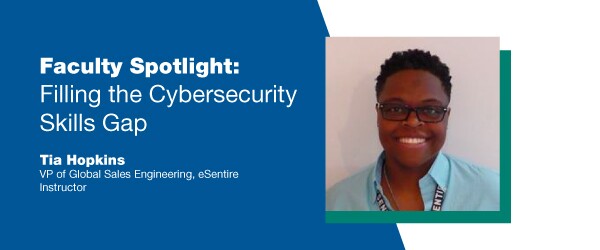For Tia Hopkins, teaching cybersecurity can’t just be about the textbook, or the certification, or the degree. It’s about showing students how to take all of that knowledge and put it to work.
“Applied knowledge and solving problems, those are the elements that are missing from a lot of master’s level programs,” she explained. “After you’ve learned and memorized the concepts, can you actually have a meaningful discussion with someone and solve a problem using this knowledge?”
Hopkins has been at the Katz School of Science and Health for three years and teaches the online course, Network, Data and Communication Security, in its online MS in Cybersecurity program. Required for all students, the course pushes them to go past just memorizing definitions.
“The goal shouldn't be studying to remember, it should be studying to understand and apply,” Hopkins explained. “If you just remember concepts, you're not relating them to anything. So, when you're in a real world situation, the concepts you simply memorized may not come to mind at the right time as the appropriate approach to solving a particular problem.”
For Hopkins, it’s not just about earning the degree or certification—thousands have done the same—it’s what you can do with those skills, the conversations you can have.
“You still have to keep learning,” Hopkins said. “I have a list of certifications longer than I'm willing to admit. I'm also studying for my PhD, and I probably won't be done after that either.
“The industry itself changes all the time. The threat landscape changes all the time. Tools change all the time. Organizational concerns and resources change all the time, so this is not a one and done industry.”
Cybersecurity Skills Gap
The list of certificates, honors and roles Hopkins has built over her career is impressive. In addition to being an active speaker, writer and educator, she’s been recognized with SC Media Reboot Leadership Award, The Software Report’s Top 25 Women Leaders in Cybersecurity, and Cyber Defense Magazine’s Top 100 Women in Cybersecurity.
Her current role is at eSentire, a Managed Detection and Response platform, focused on solving cybersecurity challenges. As Vice President of Global Solutions Architecture, she talks to customers and potential clients about the company’s services and how they can work together to address their gaps and pain points. The role requires the tech insights as well as human ones.
“I can't expect to establish credibility in a room full of security engineers, if I can't talk through how a threat would proliferate in their environment,” Hopkins said. “At the same time, I have to be able to have a conversation with a CISO who might be less worried about 0s and 1s and more concerned about time to value, getting more out of the resources on his or her team, and driving business outcomes.”
Typically, she shows how her company can help them better manage their data and understand where their pain points are. For her, it’s about creating systems balanced among people, process and technology. The right process can make sure technology catches employees’ mistakes, but the right process can also help people find the mistakes made by their tech.
“The human problem is the all too well-known cybersecurity skills gap,” Hopkins said. “Organizations just have a hard time finding skilled resources and retaining skilled resources. It becomes tough to get that coveted ‘people, process and technology’ all together.”
Encouraging More Women in Cybersecurity
In 2020, Hopkins founded Empow(H)er Cybersecurity, a nonprofit committed to diversifying the field through mentorship, education and career guidance for women of color. She launched the organization after reflecting on the mistakes she made in her own career. What started with jotting down a few ideas in her Notes app turned into a full-scale business model.
“It was pure passion,” Hopkins explained. “I couldn't stop thinking about it, it was all I wanted to do. I did not want my impact to be limited to just what I myself could touch. I wanted to help people, and within three months we had over 250 members.”
Hopkins hears many of the reasons women, particularly women of color, don’t enter the cybersecurity field. Many are worried that they’re not very skilled at coding and hacking, or they aren’t knowledgeable enough about the technology industry. Women can often get turned off from pursuing a career in tech and hear horror stories from the male-dominated field and the challenges of being successful and moving into leadership.
From personal experience, Hopkins knows women are encouraged to enter nursing, teaching or more traditionally female fields, and without role models or friends in the field, it might not occur to them that cybersecurity is even an option.
“There’s no cookie-cutter background you have to come from, no cookie-cutter skill set. It is just so, so, so wide open, and I want more people to know that—because we need more people.”
Diversity in the cybersecurity industry isn’t just an ideal, it’s a critical need. Hackers can come from all different backgrounds, and because they’re anonymous, their age or experience level doesn’t matter as much as their creativity and ability to break into networks. To fight back, cybersecurity experts can’t all be from the same mold.
“It's about thinking outside the box and solving problems—sometimes in a way that no one else has thought about,” Hopkins said. “I love it because there's a place for everyone. Whether that means that your hands are on keyboard tackling problems or you're solving privacy and compliance issues at an organization, it's all relevant. It's all important to us as individuals, to national security and to international security.”
Transform your career today.
Join a growing network of cybersecurity professionals with the online MS in Cybersecurity at Katz School of Science and Health. Learn how our master’s program is your pathway to earning today’s leading professional certifications, the Information Systems Security Professional (CISSP) and the CompTIA Network+.

